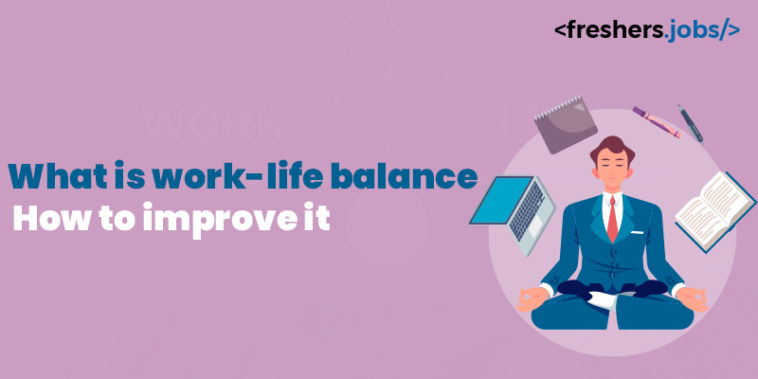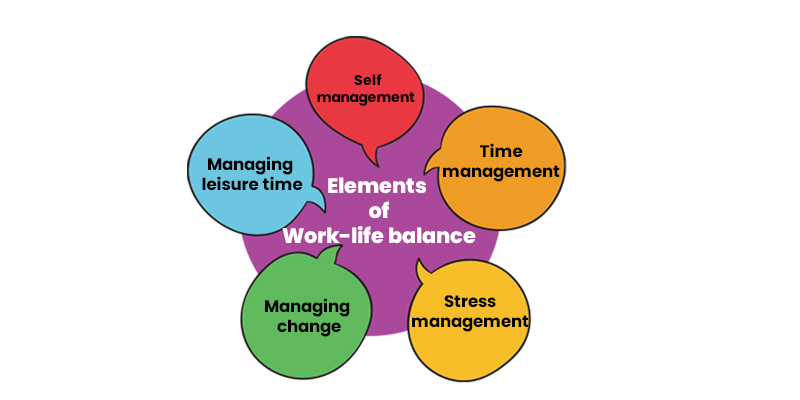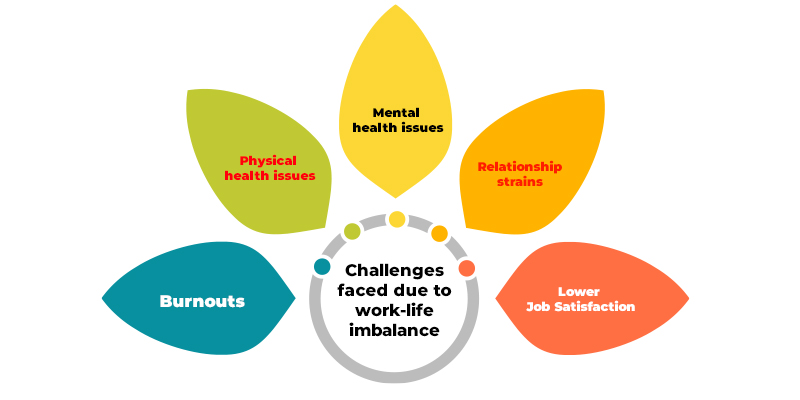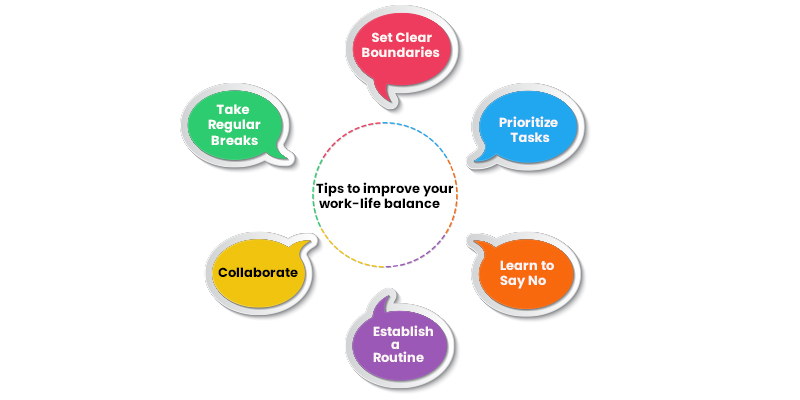Work-life balance is generally referred to as the amount of time an individual spends doing their work vs the amount of time they spend with their personal commitments, interests, etc. This is one of the most important skills a professional should have. A person who achieves this balance will dedicate the equal amount of time for work related tasks and personal matters without getting stressed and becoming overwhelmed. But obtaining this skill is a very difficult task since a lot of aspects affect it.
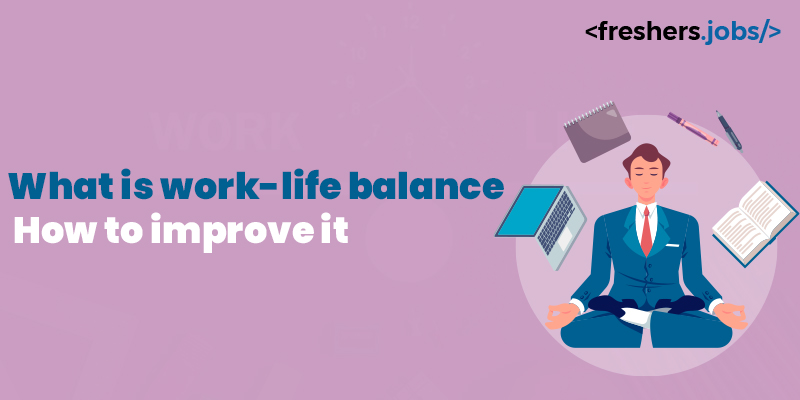
DELL offers various job opportunities for freshers. Candidates can click on DELL Jobs For Freshers to apply for job openings that align with their skills and abilities.
Elements of Work-life balance
Listed below are the six main components of Work-life balance.
- Self-management: Self-management is referred to as the ability to effectively regulate and control one’s emotions, behaviors, actions, and thoughts, to achieve personal and professional goals. It involves making informed decisions, proactively adapting to various situations and challenges, and taking responsibility for one’s own actions. It is one of the crucial components of work life balance. Self-management encompasses a range of skills and practices that contribute to increased productivity, emotional well-being, and overall success.
- Time management: Time management is the art of effectively organizing, allocating, and planning, your time to achieve goals, accomplish tasks, achieve goals, and maintain a balance between work, personal life, and other activities. It involves making informed decisions about how to invest your time in ways that maximize productivity, efficiency, and personal well-being.
- Stress management: Stress management refers to the strategies, practices, strategies, and techniques that an individual uses to effectively cope with and reduce the negative effects of stress on their mental, physical, and emotional well-being. In today’s fast-paced and demanding world, stress has become a common phenomenon, so we have to make it essential to develop healthy mechanisms to handle it and maintain overall balance.
- Managing change: Managing change in work life balance refers to the ability to adjust, adapt, and respond effectively to changing circumstances, situations, and demands. It involves being open-minded, willing to accept changes, and embracing new approaches when necessary. Managing change is a valuable aspect in both personal and professional contexts, enabling individuals to handle uncertainty, seize opportunities, and maintain a balanced and calm mindset.
- Managing leisure time: Managing leisure time involves making intentional choices to effectively utilize and enjoy your free time outside of work or other commitments. It’s about finding a balance between relaxation, personal interests, and activities that contribute to your overall well-being. Properly managing leisure time enhances your quality of life, reduces stress, and supports physical and mental health.
If you are looking for any job openings in Ahmedabad, look for job opportunities available in that city. Visit fresher job openings in Ahmedabad to find job opportunities that are relevant to your skills and interests.
Importance of Work-life balance
List below are the importance of work-life balance.
- Physical and mental health: A proper balance in life will reduce mental health issues, stress and burnouts. Spending time to take good care of yourself can support an overall well-being.
- Increased Productivity: When your work-life has an equal balance, you will have time to rest and relax. So that you can return to your work with increased creativity, focus and productivity. On the other hand, burnouts and overwork will result in less efficiency.
- Healthy relationships: Spending time with friends, family and personal interest will strengthen your emotional support and contribute to a positive mindset and overall happiness.
- Reduces stress level: Balancing both work and personal life equally can help you manage your stress level. Chronic stress issues can drastically affect your physical and mental health.
- Increased Career duration: Consistent overworking can result in increased burnouts and also affects your career duration. Sustainable work practices will promote a healthier and long-lasting professional life.
- Professional Growth: A balanced life allows you to pursue your personal interests, skill development and learning. This approach contributes continuous professional growth and development.
- Creativity and innovation: If you have an equal balance in life, it will help your mind to get good rest. A well- rested mind will open doors for creativity and innovative ideas. Balancing your work with leisure ideas can lead to fresh perspectives and creative problem-solving ideas.
- Work quality: Employees who maintain a stable balance between work and personal life can provide quality work outcomes.
- Quality of life: Finally, work-life balance contributes to fulfillment and satisfaction of life. Work-life always ensures that you have time for your hobbies, personal growth, and passion which leads to fulfilled well-being.
Factors that affect Work-life balance
Factors that affect Work-life balance.
- Expectations and Workloads: Unrealistic expectations and high workload and high demand of employers can lead to overwork and less time for personal life.
- Job flexibility: One of the key factors that affects the work-life balance is the degree of job flexibility arrangements such as flexible hours or remote work.
- Work Environment: A positive work environment will promote a balanced work-life, while a stressful and toxic work environment will affect it.
- Job Nature: Specific jobs with irregular hours, or high pressure job opportunities and roles can be more challenging to maintain a balanced work-life.
- Connectivity and Technology: Constant connection with laptops, smartphones, and other electronic gadgets can affect the boundaries between work and personal life.
- Personal responsibilities: Personal commitments such as family obligations, responsibilities can also affect the time availability for work and leisure.
- Financial issues and responsibilities: Financial concerns are another reason why an individual can’t find time for personal commitments. They are compelled to take up additional jobs or work long hours to compromise their financial issues.
- Company Culture: Company values, policies, and support for work-life balance initiatives play a vital role in an individual’s ability to balance their responsibilities.
- Personal choices: An individual’s willingness to set boundaries, Time-management skills, and priorities also impact their work-life balance.
- Health and Well-being: Mental and physical health conditions affect a person’s capacity and energy-level to handle work balance in life effectively.
- Social and Community support: Having strong support from family, friends, and social networks can easily help you tackle the challenges of balancing work and personal life.
- Career stage: Career stages like entry level position vs senior level roles plays a major role in affecting the level of time requirement and commitment for the work.
- Cultural norms: Cultural norms and expectations regarding family responsibilities and work hours can impact the perception of work-life balance.
Challenges faced due to work-life imbalance
Listed below are challenges faced due to work-life imbalance
- Burnouts: Excessive work loads and constant stress can lead to burnouts, reduced productivity, emotional exhaustion, and less job satisfaction of work and personal life.
- Physical health issues: If you neglect your personal well-being and work continuously, it will lead to a lot of physical health issues like sleep disturbance, fatigue and a lot of other illnesses.
- Mental health issues: Work-life imbalance can cause depression, anxiety, and various other mental health issues too. It occurs because individuals struggle to maintain work-life balance and manage stress.
- Relationship strains: If you spend a limited time and energy for your personal relationships and commitments, it will result in a lot of family issues like conflicts with your partner, less social connections, etc.
- Lower Job Satisfaction: An inability to achieve work-life balance can result in decreased job satisfaction, reducing interest in working and impacting overall career improvement.
- Impact on Career Growth: Working overtime can affect professional growth and advancement due to burnouts, lack of skill development, and reduced performance.
- Limited Time for Self-Care: If you prioritize work more than your self-care, activities like relaxation, exercise, and socializing can lead to a decline in overall well-being.
- Parenting Challenges: Work-life imbalance can lead to stress, guilt, and difficulty in managing parental responsibilities for working parents.
- Lack of Focus and Concentration: Getting exhausted from work can affect your personal life, impacting an individual’s ability to focus on tasks and enjoy leisure activities.
- Struggle with Boundaries: Blurred boundaries between work and personal life due to constant connectivity can prevent individuals from fully disconnecting and recharging.
- Career Dissatisfaction: Prolonged work-life imbalance can lead to feelings of career dissatisfaction, as individuals aim for a more integration of work and personal life.
- Missed Opportunities: Being preoccupied with work can lead to missed opportunities for personal growth, skill development, and memorable experiences.
Tips to improve your work-life balance
Listed below are some tips for how can we improve Work-life balance.
- Set Clear Boundaries: Fix specific work hours and personal time, and communicate these boundaries to friends, family, and colleagues. Stick to these boundaries to avoid imbalance in work and your personal life.
- Prioritize Tasks: Use effective time management techniques to prioritize tasks in such a way based on how urgent and important they are. This helps you focus on the high-priority tasks and avoid feeling overwhelmed.
- Learn to Say No: Be selective about taking on additional projects or tasks, both at work and in your personal life. Saying no when necessary can prevent you from overcommitting and helps you to maintain a manageable workload.
- Establish a Routine: By creating a daily routine that includes dedicated time for work, relaxation, exercise, hobbies, and spending time with loved ones will Consistently help you to maintain balanced work-life
- Use Technology Mindfully: Set clear boundaries for technology use outside of work hours. Spend less time to check emails and work-related messages during personal time to avoid constant connectivity.
- Collaborate: Don’t hesitate to share tasks at work or responsibilities in your personal life. This promotes teamwork and prevents you from shouldering all the burdens.
- Take Regular Breaks: Always take short breaks during your workday to recharge and refocus. Use breaks for a quick walk, deep breathing, or a brief mindfulness exercise.
- Practice Self-Care: Prioritize self-care activities like exercise, meditation, reading, or pursuing hobbies that bring you peace and joy. These activities boost your energy and reduce stress.
- Use Vacation Days: Take advantage of your vacation days to truly enjoy and disconnect from work. Use this time to relax, explore new places, or spend quality time with loved ones.
- Seek Support: Talk to your supervisor or manager about your work-life balance concerns. Opening up your mind can lead to reasonable accommodations or adjustments that benefit both you and the organization.
- Explore Flexibility: If possible, explore options for flexible work arrangements, like remote work or adjusted hours, that suit your personal needs and enhance work-life balance.
- Learn to Disconnect: When you leave work for the day, try to mentally disconnect from work-related thoughts and focus on your personal life and activities.
- Reflect and Adjust: Regularly assess your work-life balance and make necessary adjustments. Be open to trying new strategies that better align with your evolving needs.
So, maintaining your work-life balance is a mandatory process to lead a happy and peaceful well being. Always remember to set boundaries between work and personal life. Imbalance of work-life balance can lead to a lot of physical and mental issues. In this blog, we explored what is work-life balance, its components, importance, factors, challenges, and how to improve work-life balance.

